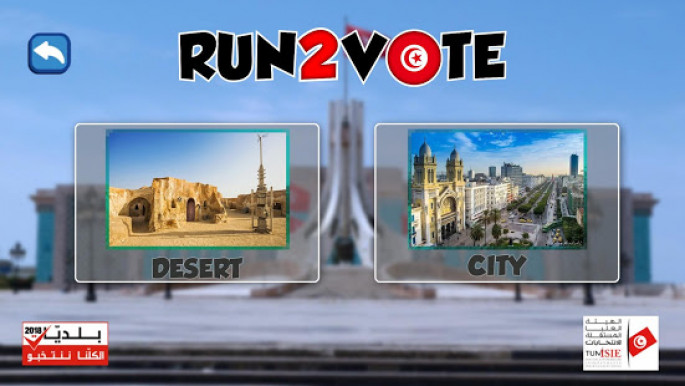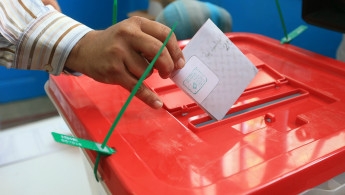Fears over turnout dampen Tunisia’s first local elections
Tunisia's first ever municipal election will be held on May 6. The fear of seeing a large abstention is looming on the horizon, particularly among the country's youth.
On April 30, only 12 percent of Tunisian security and military personnel voted. On the eve before the vote for civilians, there are fears that figures will face a large abstention at polls.
More than 5.3 million Tunisians, including 36,000 military and security forces, out of a total of nearly 8.5 million people of voting age, will be called to ballot to elect 7,280 city councillors in 350 municipalities.
The new local governance code, recently adopted by the country's parliament, is expected to empower these municipalities aimed at playing a key role in the country's economic and social development, experts explain.
Youth 'lack faith'
Following 2014's legislative election, Tunisians seem to lack faith as many of them say they are "disappointed."
"We went to vote in 2014 for people to represent us at the parliament and solve our social and economical problems, but they've done nothing," one Tunisian said.
For May 6 municipalities, the first after the revolution, a third of voters (32 percent) and the majority of candidates (29,660, or 52 percent) are under 36 – the law provides for a quota of three young by list.
Observers explain that among the population, particularly the younger one, the feeling of having been deceived by previous unfulfilled political and economical promises largely dominates.
 |
Observers explain that among the population, particularly the younger one, the feeling of having been deceived by previous unfulfilled political and economical promises largely dominates |  |
"It's not going to change anything for me to be honest, it's been years now that I'm searching for a decent job and a bit of change in my life, but nothing has happened," says Wahib, a 33-year-old activist and artist.
As the country struggles to put in place a series of economic reforms, the unemployment rate remains around 15.6 percent of the labour force.
According to a survey conducted early January by local firm, Sigma Conseil, over 61 percent of Tunisians said wanted to abstain from voting.
Read also: What do this week's elections mean for Tunisia?
'If you're fed up, express yourself'
With fears of a large abstention rate, several sensitisation campaigns kicked off to inform people on why their votes count.
Associations and NGOs took it to the street to explain that electing local representatives is the first step leading to a change.
One of these campaigns was conducted by the Tunisian Centre for Research and Documentation on Women (CREDIF). In its street campaign to convince people the vote is important, the centre launched the message: "If you're fed up, express yourself."
Nearly 48 percent of registered voters are women, according to the lists published by the country's Independent election commission (ISIE).
Another local civil rights NGO, Soyons Actifs et Actives, (Let's Be Active) has been organising coffee-debates since the start of April.
According to this association, the majority of its 200 observers deployed throughout the country are young people. The main purpose of these cafes is to target young people from 20 to 30 years old.
"Young people need to be included in social and economic life to fully participate in local and participatory democracy," Ahlem Bousserwel, the NGO's president told the website Jeune Afrique.
"Other countries see Tunisia as an exceptional experience, but it is a country of many inequalities, a lot of frustrations, and poverty," she argues, adding, "In this context, politics is the population's very last concern."
 |
|
| The independent election commission launched a video game named Run2Vote |
Meanwhile, in their attempt to reach out to the younger generation of voters, the independent election commission launched a video game named "Run2Vote". In this game, players must collect national ID cards, the voting booth and the ballot box. They are then sent messages relating to voting procedures.
"This game was invented by young Tunisians who wanted to encourage the youth to participate in building the new democratic Tunisia," read the commission's game description.
Political parties vs independent candidates
Since the first day electoral campaigns kicked off on April 14, political parties across the country have embarked on a race against the clock.
The country's two major parties, the ruling party of Nidaa Tounes and Ennahdha, out of the 211 officially existing parties, presented lists in all existing municipalities.
Both presented 350 lists, each making them the first in line, while there are 2,173 other independent candidates with no links to any political party.
The Islamist party Ennahdha decided to spread awareness by trading door-to-door. According to the party's leadership, their campaigning candidates came across pros and cons.
"We tried to convince the cons that it's for their benefit to share their voice and be responsible for their local decision-making," a candidate from the party told The New Arab.
Massinissa Benlakehal is a freelance journalist, covering politics, society, human rights and security related issues in North Africa.



